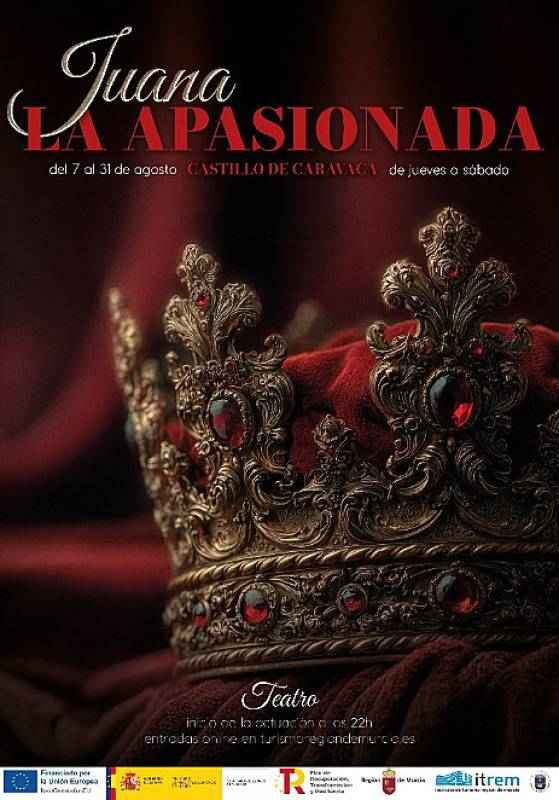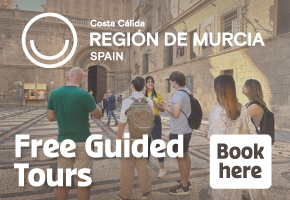- Region
- Águilas
- Alhama de Murcia
- Jumilla
- Lorca
- Los Alcázares
- Mazarrón
- San Javier
-
ALL AREAS & TOWNS
- AREAS
- SOUTH WEST
- MAR MENOR
- MURCIA CITY & CENTRAL
- NORTH & NORTH WEST
- TOWNS
- Abanilla
- Abarán
- Aguilas
- Alamillo
- Alcantarilla
- Aledo
- Alhama de Murcia
- Archena
- Balsicas
- Blanca
- Bolnuevo
- Bullas
- Cañadas del Romero
- Cabo de Palos
- Calasparra
- Camping Bolnuevo
- Campo De Ricote
- Camposol
- Canada De La Lena
- Caravaca de la Cruz
- Cartagena
- Cehegin
- Ceuti
- Cieza
- Condado de Alhama
- Corvera
- Costa Cálida
- Cuevas De Almanzora
- Cuevas de Reyllo
- El Carmoli
- El Mojon
- El Molino (Puerto Lumbreras)
- El Pareton / Cantareros
- El Raso
- El Valle Golf Resort
- Fortuna
- Fuente Alamo
- Hacienda del Alamo Golf Resort
- Hacienda Riquelme Golf Resort
- Isla Plana
- Islas Menores & Mar de Cristal
- Jumilla
- La Azohia
- La Charca
- La Manga Club
- La Manga del Mar Menor
- La Pinilla
- La Puebla
- La Torre
- La Torre Golf Resort
- La Unión
- Las Palas
- Las Ramblas
- Las Ramblas Golf
- Las Torres de Cotillas
- Leiva
- Librilla
- Lo Pagan
- Lo Santiago
- Lorca
- Lorquí
- Los Alcázares
- Los Balcones
- Los Belones
- Los Canovas
- Los Nietos
- Los Perez (Tallante)
- Los Urrutias
- Los Ventorrillos
- Mar De Cristal
- Mar Menor
- Mar Menor Golf Resort
- Mazarrón
- Mazarrón Country Club
- Molina de Segura
- Moratalla
- Mula
- Murcia City
- Murcia Property
- Pareton
- Peraleja Golf Resort
- Perin
- Pilar de la Horadada
- Pinar de Campoverde
- Pinoso
- Playa Honda
- Playa Honda / Playa Paraíso
- Pliego
- Portmán
- Pozo Estrecho
- Puerto de Mazarrón
- Puerto Lumbreras
- Puntas De Calnegre
- Region of Murcia
- Ricote
- Roda Golf Resort
- Roldan
- Roldan and Lo Ferro
- San Javier
- San Pedro del Pinatar
- Santiago de la Ribera
- Sierra Espuña
- Sucina
- Tallante
- Terrazas de la Torre Golf Resort
- Torre Pacheco
- Totana
- What's On Weekly Bulletin
- Yecla


- EDITIONS:
 Spanish News Today
Spanish News Today
 Alicante Today
Alicante Today
 Andalucia Today
Andalucia Today
August 2025 Historical drama in Caravaca about Juana la Loca, the supposedly mad queen of Spain
Juana la Apasionada proposes an alternative theory about the Queen who reigned for 39 years but was never freed from confinement
 Queen Juana I of Castilla, is perhaps most easily identified for those who know more about British than Spanish history as the elder sister of Catherine Aragon, the first wife of Henry VIII, but in Spain she is at least as famous as her sibling mostly due to her unfortunate nickname of “Juana la Loca” (Juana the Mad).
Queen Juana I of Castilla, is perhaps most easily identified for those who know more about British than Spanish history as the elder sister of Catherine Aragon, the first wife of Henry VIII, but in Spain she is at least as famous as her sibling mostly due to her unfortunate nickname of “Juana la Loca” (Juana the Mad).
Whether she was actually insane or not is a matter fiercely debated by historians, but the fact is that after she inherited the throne in 1516 following the death of her husband, Felipe II of Aragón, she was remained in confinement (where she had been since 1509) until her death 39 years later. For this reason she was queen only in name, the reins of power being handed first to her father and then to her son, Carlos I.
The official reason for her confinement in the castle of Tordesillas and others was that she was both physically and mentally impaired, her condition being variously described as melancholy, severe depression, psychosis, schizophrenia and others, most of these conclusions having been reached centuries after her death.
But whatever her condition, it is hard to believe that being imprisoned for 46 years by her own family, and probably being maltreated by her custodians, cannot have had a beneficial effect, and this dramatization at the castle of Caravaca de la Cruz represents a counter-theory that she should be known as “Juana la Apasionada”, or Juana the Impassioned. One cornerstone for this argument concerns her behaviour after the demise of her husband, when she stubbornly refused to leave the side of his coffin as it was transferred from Burgos to Granada so that his remains could lie alongside those of his mother (except for his heart, which was sent to Brussels!).
Another theory is that her madness was simply invented by her father, Fernando el Católico, so that he could assume power following the death of Felipe. All of these theories remain unproven, largely because Fernando and Carlis were suspiciously careful to destroy all documentary evidence including their own correspondence.
The performances at Caravaca castle take place every Thursday, Friday and Saturday during August, starting at 22.00. Tickets are priced at 12 euros (11 euros for children) and are available online here.
For more local events, news and visiting information contact the tourist office and information points or go to the home page of Caravaca Today.







